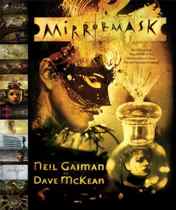 [vc_widget_sidebar sidebar_id=”sidebar-sidebar-reviews”]
[vc_widget_sidebar sidebar_id=”sidebar-sidebar-reviews”]
Mirrormask
2005
Director:
Starring: Directed by Dave McKean
Reviewer:
Genre: Non Asian Movie Reviews
Rating:
Starring: Stephanie Leonidas, Gina McKee, Rob Brydon, Jason Barry, Dora Bryan, Stephen Fry, Robert Llewellyn, Andy Hamilton
101 minutes
Reviewed by Jeremy Silman
Rating (a 1 6 scale): 5.5

This is a film that created huge rifts between reviewers. On the negative side you had the, “It needed a stronger story! group. The name-calling group (“Unoriginal! “Banal! “Boring! “Confusing!). And, of course, we also got the ubiquitous “Why? group (“Why are there stone giants floating in the park?).

The thumbs up crowd thought it fun, original, magical, and marveled at its riveting effects and visionary art.

The story seemed straightforward: A 15-year-old girl (Stephanie Leonidas as Helena) works in her familys circus as a juggler. However, like all teens, she rebels at the nomadic life this entails. Thus she seeks refuge in mood swings, anger at her mother and father, and drawing odd images that decorate her room. When her mother becomes extremely ill, she feels guilt and retreats to an amazing fantasy world (or actually enters one you can interpret this in different ways). Can she escape from it and enter “reality, or is she to be forever trapped in her minds own fever dream?

This seems to be a very strong story to me, but those crazy “needs a stronger story people just arent happy without their daily glass of roughage and dose of story-raves.
The name-calling group (“Unoriginal! “Banal! “Boring! “Confusing!) seems way off base in this case, and most likely were referring to their own reviews rather than the movie.
This leaves us with the “Why? group. “Why are there stone giants floating in the park? Why does any dream (or fantasy world) have anything in it? I could impose a long lecture by Dr. Freud on my readers, but I think shunning the “Why crowd is the best answer to their inane question.
The basic story Ive outlined is as old as humanity itself. A no frills version might interest teenage girls or their parents, but most adults would prefer to spend time on something else. Fortunately, its the frills that stand out and leave the audience gasping in wonder. Here are visions never before made available on film. Cities only walked through in nightmares. And surreal vistas of such grandeur that anyone of any age will feel something akin to awe.

In a way, Mirrormask is a modernized Wizard Of Oz. Both films feature a teen female leaving this world for a far more fantastic one. Both boast top quality effects for their time. Both find “alien characters residing in their fever dream landscape that is reminiscent of family and friends from the real world. Both feature the girl trying desperately to leave the “odd place theyve ended up in. Both have to face an all-powerful dark witch/queen. And both, ultimately, end with the once petulant teenager realizing that there really is no place like home.
The Wizard Of Oz, of course, is the far more innocent movie of the two. But things now arent what they were then, and these terrifying times force the modern teen to think much deeper, darker, terrifying thoughts. Mirrormask introduces us to a form of vertigo in its real world, and makes that sense of eternal darkness and ruptured despair even greater when Helena seeks emotional salvation in fantasy.

If Dr. Freud was still among us, he might say that these dark and terrifying and confusing landscapes are actually the teenage years themselves, and our escape from them (finding our way home to the real world) is our ascendance into adulthood. But to me, such conjecture is all hogwash. You can manipulate the meaning of Mirrormask in many ways, but no matter what mindset youre coming from (or message you wish to find), we can all agree that this film is a startling piece of eye candy. Mirrormask unabashedly whispers of worlds within worlds, and triumphantly demonstrates the depths of human imagination in a way that few movies have ever done before.
